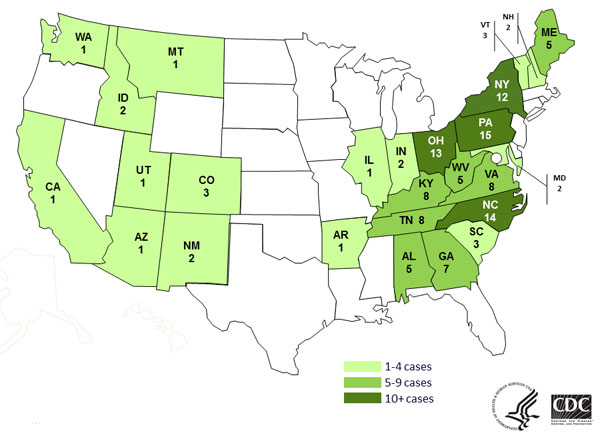Salmonella outbreak linked to live poultry grows to 126 cases
A Salmonella outbreak linked to live poultry from a mail-order hatchery in Ohio has grown to 126 cases in 26 states, the Centers for Disease Control and Prevention (CDC) said today. The CDC first announced the outbreak on May 8, when it involved 60 cases in 23 states.
The patients range in age from less than 1 year to 95, with a median age of 28 years, the CDC said. Of 81 case-patients with available information, 28 (35%) were hospitalized. Of 88 patients interviewed, 72 (82%) reported contact with live poultry such as chicks and ducklings before becoming ill.
The outbreak involves both Salmonella Infantis and Salmonella Newport strains.
Nineteen (90%) of 21 ill people with available information reported buying live baby poultry from five different feed or farm store companies in multiple states. "Findings of multiple traceback investigations of live baby poultry from homes of ill persons have identified Mt. Healthy Hatcheries in Ohio as the source of chicks and ducklings," the CDC said.
"This is the same mail-order hatchery that has been associated with multiple outbreaks of human Salmonella infections linked to live poultry in the past, including in 2012 and 2013," the agency added.
The 66 new cases are from 18 states: Alabama, 4 cases; Colorado, 1; Georgia, 5; Illinois, 1; Indiana, 1; Kentucky, 2; Maine, 4; Montana, 1; New Hampshire, 1; New Mexico, 1; New York, 6; North Carolina, 11; Ohio, 7; Pennsylvania, 7; South Carolina, 3; Tennessee, 5; Virginia, 5; and West Virginia, 1. Illinois, Montana, and South Carolina reported their first outbreak cases. (See CDC map below.)
May 30 CDC update
May 8 CIDRAP News scan on initial outbreak notice
Persons infected with the outbreak strains of Salmonella Infantis or Newport, by state*

*n=126 for whom information was reported as of May 27, 2014
Chikunguyna reported in Puerto Rico, Tahiti
Chikungunya cases have now been reported for the first time in the US territory of Puerto Rico as well as an ocean away in Tahiti, according to media reports.
Health officials in Puerto Rico confirmed a chikungunya case in a 16-year-old girl who lives in the capital, San Juan, the Associated Press (AP) reported yesterday. Officials are investigating how the girl, who did not require hospitalization, contracted the mosquito-borne disease.
The Caribbean has seen more than 63,000 cases of chikungunya in an outbreak that began in December.
Meanwhile, authorities in Tahiti (French Polynesia) have detected the disease in a 60-year-old woman who had recently traveled from Guadeloupe, a Caribbean island that has reported almost 20,000 suspected or confirmed chikungunya cases. Her case is Tahiti's first.
She likewise did not receive hospital care, according to a report today by Radio New Zealand. Tahiti sits in the middle of the Pacific, more than 2,500 miles south of Hawaii.
May 29 AP story
May 30 Radio New Zealand story











